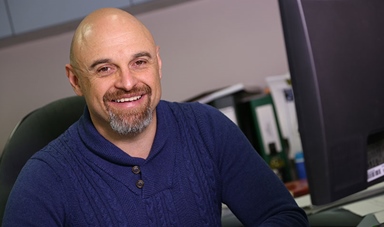Loading component...
At a glance
Fact file
Joined: August 2011 as financial controller; promoted to CFO in 2017B
Qualifications: Bachelor of business, accounting, economics, Monash University
Formerly: With freight and logistics company Australia airExpress from 1992 to 2011
Finance team: 80
Turnover: A$500 million
The role: "healthy outcomes"
I am responsible for managing the financials of Cabrini Health, a Catholic, not-for-profit healthcare service in Melbourne with more than 4000 employees. A critical component of the role is staying up to date with the external business environment, not just looking inward.
It is also critical, as CFO, that I’m deeply involved in strategy, factoring in economic trends such as demand and ensuring the right investment decisions are made. “Breaking the frame” and ensuring the organisation is on the right growth path is crucial for long-term sustainability.
As leader of the finance team, I have executive responsibility for Cabrini’s patient accounts, payroll, accounts payable, billings and receivables, management accounting, private health funds, and finance and treasury functions. The information and data my team takes to our executive, board and board subcommittees must be the latest available – and it should be concise and clear. There is no use taking a rambling 30-page report to committees because interest will wane and the message will be lost.
I try to distribute shorter-format reports with clear headlines to convey information, especially when those documents inform important management or board decisions.
My ultimate aim is to advance the Cabrini mission – we offer a community of care, reaching out with compassion, integrity, courage and respect to all we serve – and this gives me great job satisfaction. Through our social outreach and community engagement programs, we allocate funds to Indigenous health and medical services to Swaziland and Ethiopia. We also have a refugee health hub in Brunswick, Melbourne.
Proceeds from Cabrini’s activities are critical to ensuring that our commitment to these charitable causes is sustained indefinitely, so the finance team has to be up to the job.
Game changes: "big break"
Emigrating from Malta to a recession-hit Australia in 1982 as a 15-year-old was quite tough for my family, and I didn’t get the chance to go to university. I later picked up some administration jobs and finally joined the freight and logistics industry in 1992 with Australian airExpress, an arm of Qantas and Australia Post.
My big break came in the form of support from the CFO at the time, who saw something in me and encouraged me to take on an assistant accounting role. Three years into that job, I applied for a vacant financial administration manager’s role, only for the CFO to bluntly tell me that I was not qualified for the position. In the same breath, though, he told me that he’d fund my education, allowing me to do a degree majoring in economics and accounting at Monash University.
He also funded my CPA Program and, in return for this life-changing action, I was able to reward him with 19 years of service in total at the company, until my job become redundant after a corporate split.
I joined Cabrini in 2011 as financial controller in another pivotal moment for my career, when the CFO took a punt on me despite having a background in freight and logistics rather than health. So, I made the leap from a commercial dog-eat-dog sector to a not-for-profit organisation.
What I love about Cabrini is that it’s all about the people and not shareholder benefits. Our team talks about the margin versus the mission and the fact that without decent margins there can be no mission.
The importance of a sustainable mission was underlined during a pilgrimage a few years ago of eight staff to Codogno, Italy, where St Frances Xavier Cabrini established her congregation. We had a chance to experience and explore the empathy and caring of the Cabrini culture and Mother Cabrini’s birthplace.
Challenge: "tough market"
It has been well documented that the private health industry is experiencing a tough market. Wages growth is tight and private health insurance costs are rising year on year, prompting many private patients to go to public hospitals. This is happening across the entire healthcare industry, not just at Cabrini, at a time when our biggest competitor – public hospitals – continue to offer services for free. You can’t beat free.
However, if more and more patients go public the nation’s health system will be unsustainable, so private health services are crucial and Cabrini will continue to play a key role. We are currently building a new wing in our Malvern hospital, called the Gandel Wing, which will boost patient care. This is a significant investment and shows how committed Cabrini is to its patients and the future.
On a personal front, the CFO’s role is clearly changing. Focusing on traditional accounting duties is no longer enough at a time when data and automation are increasingly coming to the fore. If finance leaders are not up to speed, they will lag behind. That’s certainly a challenge for me and our team.
Lessons learned and best advice
Think outside the square
As an example, I used to admire the business graphics in the Australian Financial Review, so I called them and asked which graphics editing program they used (it’s Adobe Illustrator). Since then I’ve been able to produce great graphics that lift the professionalism of board reports, put the key issues in the headlines and lead to better business decisions.
Keep abreast of everything
CFOs must understand the external environment – not just their internal issues – if they are to understand what is affecting demand.
Read more and reach out
In line with understanding the market, it is important to read newspapers and industry publications and to tap into networks for the latest investor and analyst data.

